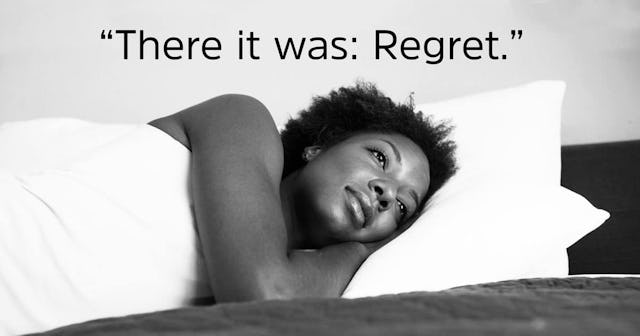Regret Is An Inevitable Part Of The Grieving Process

My mother conveyed my father’s cancer diagnosis through an e-mail. It was cheerfully worded, full of hope and gratitude — so much so that I almost missed the gravity of it.
Everyone has their own way of being afraid; mine is to soothe myself with more information and connection to people who love me.
I called a doctor friend who listened to the details without understanding I was asking about my dad (I’ve thought a lot about my lack of transparency here, and all I can say is, I needed the stripped-down truth — no flowers or sugar coating).
“That guy’s got no more than a year. If I were him, I’d skip the treatment.”
BAM. Sugarless truth.
I wish I could tell you I hung up the phone and meditated or prayed.
I walked straight into the high-end fried chicken restaurant (there is such a thing apparently) next to my office and sidled right up to the bar. I was hyperventilating.
I asked for a “very large gin and tonic.”
“A double?” the bartender asked, just like in the movies. I’m not much of a drinker and didn’t know if a double meant twice the size or twice the gin, but I did know my dad was dying.
My husband was out of the country, time zones away. I called the woman who has been my best friend since I was lucky enough to stumble across her the summer of fifth grade.
“Oh my God, what?” She’s the kind of friend that can hear chaos in the sound of my breath.
“He’s dying.”
“Oh, honey.”
I made an immediate plan of action. If I had a year with my dad, I wanted to see him as much as possible. Simple.
We didn’t have books in common, or politics in common, or movies in common, or a faith base in common, but he was my dad and he deserved to feel loved by me. I deserved it, too. We had love in common.
Roy Hsu/Getty
I told my husband that night, I wanted to be with my dad as often as I could because:
“I don’t want to look back with any regrets.”
On Mother’s Day morning, my father woke disoriented. One trip to the ER and a dangerously high potassium level reading later, and I’d changed my weekend trip to a week and waited for my father’s health to stabilize.
My family is lucky to have a deep bench of subs, and my sister came as I left to get back to my kids and my husband, who had work travel.
We sat in a local fried fish shop, and I gave her all the information I knew. We didn’t exactly know how dire the situation was, but also really, we did.
“I’ll be back up when I can.”
“I’ve got it.”
“I know, I just don’t want to look back and regret not spending as much time with him as I could.”
I did go back — a few times. My dad and I settled into a sort of routine where I’d sit next to him in the quiet (I can be good at quiet if I try). Eventually, he’d say something like, “Let me take you through my contact list.”
At first, it was subtle and indirect. Eventually, we were using words like “funeral,” and “eulogy,” and my dad was doing his best to acquaint me with his wishes.
I brought my kids to see him in June for his 80th birthday, and rushed to him again eleven days later, barely in time to hold his hand and say goodbye.
The funeral home and the hospice team were helpful and careful and gentle. He’d been with us, and then he wasn’t. Died. Dead.
And when my mind starting forming thoughts again, this was the first one:
“Why didn’t I sit with him for the hour he was waiting for surgery? If I’d stayed with him…then I wouldn’t feel so bad.”
There it was:
Regret.
Not even an hour after my dad died.
I’d visited him more times in the past year than ever before, and my first thought was to regret I hadn’t done more.
And then I got it.
There is no outsmarting regret.
Regret is part of grief. You can’t go over it. You can’t go under it. You have to go through it.
And also it lies.
Regret says, “I wish I’d… had more time, stayed longer, said the right thing, been more kind, more patient, more honest, more mature, more loving, more direct…and then I wouldn’t feel this bad.”
And that’s the lie.
It was always going to feel this bad.
Because when someone you love dies it always feels exactly this bad.
And I get it, I do. You want me to know “No, really! If I’d just gotten there to tell him I Ioved him before he died, I’d feel better.”
Maybe.
But what I know for sure is that you are heartbroken. I’m heartbroken. It’s hard to know how to move forward.
And maybe that’s the whole point of regret anyway. Regret helps us survive the pain of the present by focusing on the past and blaming us for it.
Maybe it even distracts us from the overwhelm of trying to imagine a future that includes such loss.
I let go of the regret of those minutes missed with my dad (over and over I let it go, regret knocks often) in the hopes of remembering the thousands of extra minutes we did get together.
Because that is where the love lies.
This article was originally published on